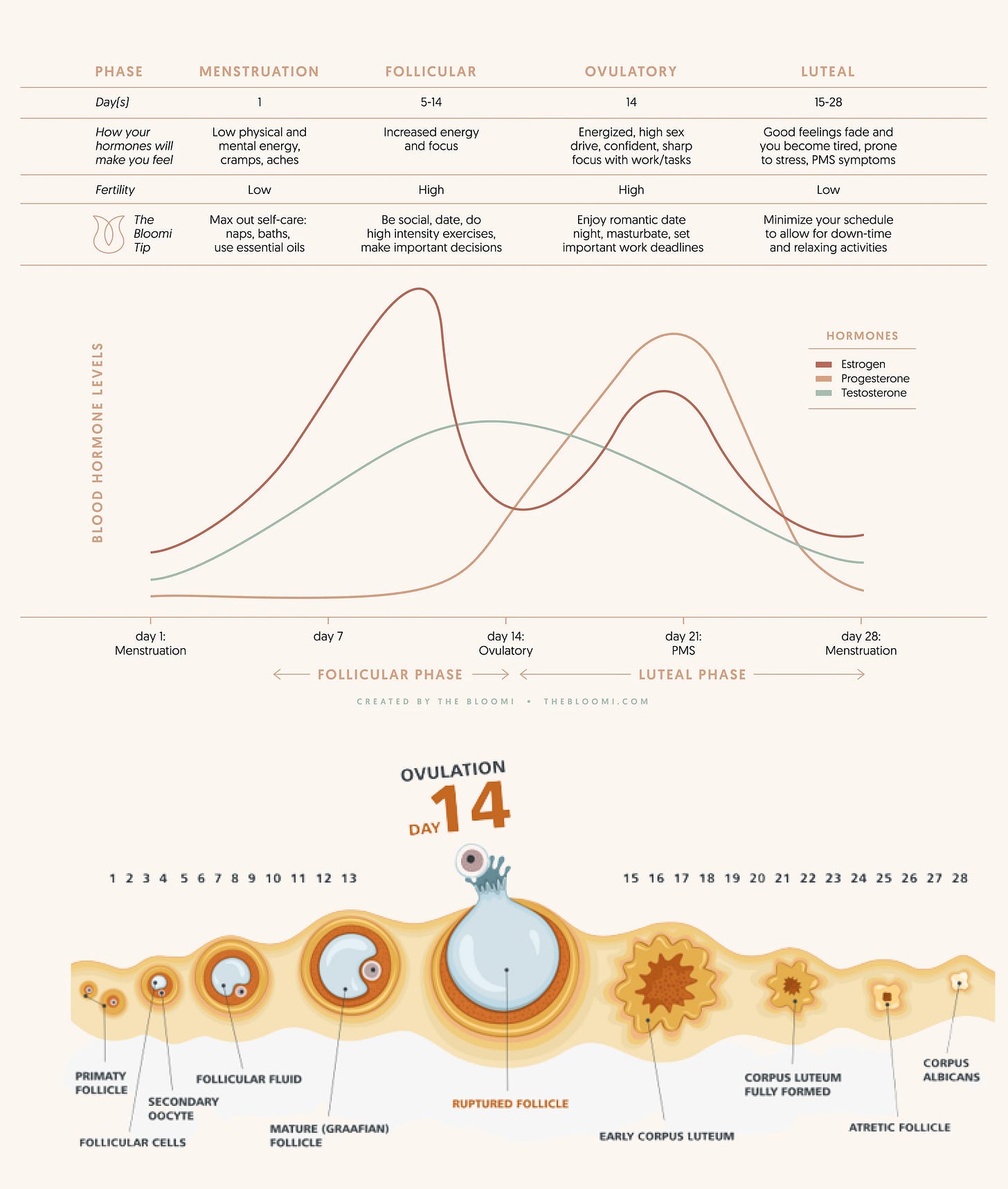PCOS and Estrogen #44
What happens to Estrogen when I have PCOS?
Hello beautiful people,
How was your week? I am currently in Berlin for work. It is such a cool city and a heaven for healthy food. It’s full of cute cafes selling vegetarian dishes or bowls full of nourishment. I have found it relatively easy to eat a balanced diet.
In today’s newsletter, I wanted to touch on Estrogen. We discuss testosterone in abundance when it comes to PCOS, but all our hormones are connected.
This week’s question
What happens to Estrogen when I have PCOS?
What is the role of Estrogen in our cycle?
Estrogen plays a pivotal role in the female reproductive cycle. In the follicular phase, the brain and pituitary gland release follicle-stimulating hormone (FSH), prompting the ovary to develop a follicle containing an egg. This follicle produces rising estrogen levels, which thickens the uterine lining and triggers the pituitary to release a large amount of luteinizing hormone (LH). This LH surge leads to ovulation, where the egg is released from the ovary. Post ovulation, in the luteal phase, the ovary produces estrogen and progesterone, preparing the uterus for potential embryo implantation and pregnancy.
When it comes to PCOS, we know that often there are imbalances. Multiple small follicles accumulate in the ovary, none growing to a size that triggers ovulation. This leads to imbalanced levels of estrogen, progesterone, LH, and FSH. Elevated levels of LH in PCOS can increase androgens, male hormones, which are normally produced by the ovaries and adrenal glands. This hormonal imbalance can lead to symptoms like irregular menstrual cycles, excessive facial hair growth, acne, and infertility.
I explain this well in this video if you are a visual person.
What happens to Estrogen when PCOS is present?
In women with PCOS, Estrogen's typical dance is disrupted, leading to a consistent, albeit lower, secretion due to numerous immature follicles in the ovaries.
The absence of the characteristic mid-cycle Estrogen peak means ovulation often doesn’t happen, causing continuous exposure to estrogen without its counterpart, progesterone, to balance it out.
But the story doesn't end there. The brain's regulatory mechanisms, involving the hypothalamus and pituitary gland, get thrown off, causing further hormonal imbalances, notably in the follicle-stimulating hormone (FSH) and luteinizing hormone (LH). This skewed hormonal environment pushes the ovaries to produce more testosterone, which can circle back as estrogen, intensifying the already estrogen-rich milieu.
The result? A cascade of symptoms familiar to us, from irregular menstrual cycles and ovarian cysts to excessive hair growth and acne.
What are the consequences of Estrogen Exposure?
The consequences of altered estrogen levels in women with PCOS extend beyond reproductive health, impacting various systems of the body:
Metabolic Implications: Women with PCOS often exhibit insulin resistance, which is exacerbated by elevated Estrogen levels. Excess estrogen can alter the function and expression of insulin receptors, making cells less responsive to insulin. Changes in inflammation and oxidative stress, two factors impairing insulin signalling, have also been observed with altered Estrogen levels.
Weight gain: Estrogen imbalances can lead to increased adiposity, particularly in the abdominal area, associated with insulin resistance.
Endometrial Health: Chronic exposure to estrogen can lead to endometrial hyperplasia, a thickening of the lining of the uterus. This condition increases the risk of endometrial cancer. 😔
Mental Health: Estrogen plays a pivotal role in modulating neurotransmitter systems in the brain, including serotonin, dopamine, and norepinephrine. Imbalances in estrogen levels, particularly during periods like premenstrual syndrome (PMS), postpartum, or perimenopause, can disrupt the balance of these neurotransmitters. Such disruptions can influence mood, stress response, and overall brain function, potentially leading to mood disorders, anxiety, and depression.
Bone Health: Estrogen is crucial for bone density maintenance. Prolonged estrogen imbalances can lead to decreased bone density, increasing the risk of osteoporosis and fractures in later life.
Cardiovascular Health: Estrogen has protective effects on the cardiovascular system. Disrupted estrogen levels can lead to an increased risk of hypertension, atherosclerosis, and other cardiovascular diseases.
Skin and Hair Changes: Elevated estrogen levels can lead to skin issues such as acne and oily skin. Additionally, it can contribute to hair thinning on the scalp and excessive hair growth on the face and body.
How can I know what my Estrogen Levels are like?
Testing estrogen levels is an essential diagnostic tool in evaluating ovarian function, assessing fertility, and diagnosing conditions like PCOS. Due to Estrogen levels fluctuating throughout the menstrual cycle, reaching their peak just before ovulation and then rapidly declining, the timing of the test is crucial.
For menstruating women, estrogen levels are typically measured on the third day of the menstrual cycle. This timing provides a baseline level, as it's early in the follicular phase when estrogen rises but hasn't peaked yet. For those who don't have regular periods, the test can be done at any time, but it's essential to note the last menstrual period or any hormonal treatments being taken.
The test is straightforward, involving a blood sample taken from a vein in the arm. This sample is then analysed to measure the amount of estradiol, the primary form of estrogen, in premenopausal women.
I hope you found this article useful. It shows how interlinked our bodies are and the importance of caring for our condition. If you have more questions about your PCOS or help managing it, don’t hesitate to drop me a line.
See you next Sunday,
Francesca
1 Sources
References
Dumitrescu, R., Mehedintu, C., Briceag, I., Purcarea, V. L., & Hudita, D. (2015). The Polycystic Ovary Syndrome: An update on metabolic and hormonal mechanisms. Journal of Medicine and Life, 8(2), 142.
Estrogen. (n.d.). Cleveland Clinic. Retrieved November 11, 2023, from https://my.clevelandclinic.org/health/body/22353-estrogen
Reed, B. G., & Carr, B. R. (2018). The normal menstrual cycle and the control of ovulation. MDText.com.
Xu, X.-L., Deng, S.-L., Lian, Z.-X., & Yu, K. (2021). Estrogen receptors in polycystic ovary syndrome. Cells (Basel, Switzerland), 10(2), 459. https://doi.org/10.3390/cells10020459


